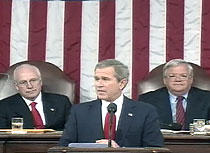2007年VOA标准英语-US President's State of the Union Address Is St(在线收听)
Washington, DC
22 January 2007
watch State of Union report
President Bush will deliver his State of the Union Address on Tuesday before both houses of Congress, members of the Supreme Court, his Cabinet, other senior government officials and the American people. Jim Bertel looks at the history and significance of this political custom, which goes back to the founding of the American republic.

President Bush delivering his State of the Union Address in 2006
President Bush's address to both houses of Congress continues a long-standing tradition of communication between the executive and legislative branches of the United States government.
Under the U.S. Constitution, an American president must report to Congress on the state of the nation, his policy plans and on any other issues he considers necessary and expedient. The Constitution gives no further guidance, but the presidential message, now commonly called the State of the Union Address, has become an annual political ritual.
The tradition began with the first president, George Washington, who delivered his yearly messages in person. Delivery in person fell out of favor, though, under third president Thomas Jefferson. American University professor Allan Lichtman explains that Mr. Jefferson felt appearing before Congress made a president seem too much like royalty.
"So Jefferson, in 1801, decided he would not appear personally before Congress, but rather he would deliver a written annual message. And, lo and behold, we changed the precedent. Since Jefferson, presidents kept delivering annual messages, but in writing rather than in person, until another great political leader came on the scene -- Woodrow Wilson."
President Wilson went before Congress in 1913 to deliver his proposal for economic regulation. The next president to appear in person was Franklin D. Roosevelt, whose annual speech was the first to be broadcast on radio: "Mr. Speaker, members of the Senate and the House of Representatives..."
Stephen Wayne is an expert on the presidency at Georgetown University in Washington. "The State of the Union address has become the way in which the president sets the agenda for Congress and speaks to the American people about his accomplishments and hopes for the future,” says Wayne. “It's part of our political tradition. There is a lot of ceremony attached to it, and that usually works to the benefit of the president."
Abraham Lincoln, in fact, used the annual message in 1862 to launch his first attack on slavery, saying that without slavery there would have been no U.S. Civil War. Franklin D. Roosevelt announced his "economic bill of rights" in one of his addresses. Harry Truman went before Congress to outline the program he called "the Fair Deal." And Lyndon Johnson in the 1960s proposed new civil-rights laws and efforts to eradicate poverty: "And this administration, today, here and now, declares unconditional war on poverty in America."
This year, President Bush will try to reinvigorate his second-term agenda following a difficult 2006, in which voters swept out Republican office-holders and put opposition Democrats in control of both houses of Congress. Experts from both parties say November's elections amounted to a referendum on Mr. Bush's Iraq policies.